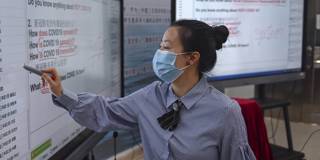While China’s government has rolled back its strict zero-COVID regime, it faces multiple short-, medium-, and long-term challenges that could impede economic growth. To restore rapid GDP expansion, Chinese policymakers must break the cycle of pessimism and recover lost household and corporate confidence.
NEW YORK – China’s recent decision to abandon its strict zero-COVID policy has led many to believe that its economy will bounce back. The Economist Intelligence Unit, for example, has revised its forecast for Chinese GDP growth in 2023 upward, to 5.2%. But growth recovery is not automatic, and China must contend with several challenges, including declining confidence among firms and households about their future incomes in the short run, insufficient productivity growth in the medium run, and an unfavorable demographic transition in the long run.
Restoring confidence may be more important than expanding credit in the short run. Following a sustained period of repeated lockdowns, many small entrepreneurs and workers in traditional service sectors who have feared for their jobs and incomes are reluctant to make purchases. Likewise, many firms are wary of investing, after recent revenue disruptions and tighter regulatory scrutiny in education, tech, and other sectors. In a recent survey of domestic and foreign firms operating in China, the Shanghai-based China Europe International Business School found that Chinese business confidence has sunk to a new low.
Pessimism can be self-fulfilling. If enough businesses and households lose confidence and cut their spending, there will be lower demand for products and services by other firms. But lower revenues would eventually hurt these firms’ own upstream suppliers. To break the cycle of pessimism, Chinese policymakers must restore confidence in the short term. But their options are constrained. Making future policies more predictable would be very useful to enhance confidence, but policy predictability cannot be achieved by a simple government proclamation. While credit expansion would boost aggregate demand, it could have the undesirable effect of driving up inflation. Meanwhile, costly COVID-19 testing and quarantines have strained China’s fiscal capacity.

NEW YORK – China’s recent decision to abandon its strict zero-COVID policy has led many to believe that its economy will bounce back. The Economist Intelligence Unit, for example, has revised its forecast for Chinese GDP growth in 2023 upward, to 5.2%. But growth recovery is not automatic, and China must contend with several challenges, including declining confidence among firms and households about their future incomes in the short run, insufficient productivity growth in the medium run, and an unfavorable demographic transition in the long run.
Restoring confidence may be more important than expanding credit in the short run. Following a sustained period of repeated lockdowns, many small entrepreneurs and workers in traditional service sectors who have feared for their jobs and incomes are reluctant to make purchases. Likewise, many firms are wary of investing, after recent revenue disruptions and tighter regulatory scrutiny in education, tech, and other sectors. In a recent survey of domestic and foreign firms operating in China, the Shanghai-based China Europe International Business School found that Chinese business confidence has sunk to a new low.
Pessimism can be self-fulfilling. If enough businesses and households lose confidence and cut their spending, there will be lower demand for products and services by other firms. But lower revenues would eventually hurt these firms’ own upstream suppliers. To break the cycle of pessimism, Chinese policymakers must restore confidence in the short term. But their options are constrained. Making future policies more predictable would be very useful to enhance confidence, but policy predictability cannot be achieved by a simple government proclamation. While credit expansion would boost aggregate demand, it could have the undesirable effect of driving up inflation. Meanwhile, costly COVID-19 testing and quarantines have strained China’s fiscal capacity.